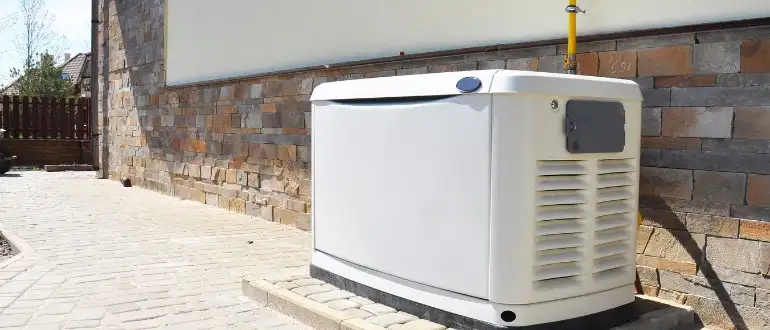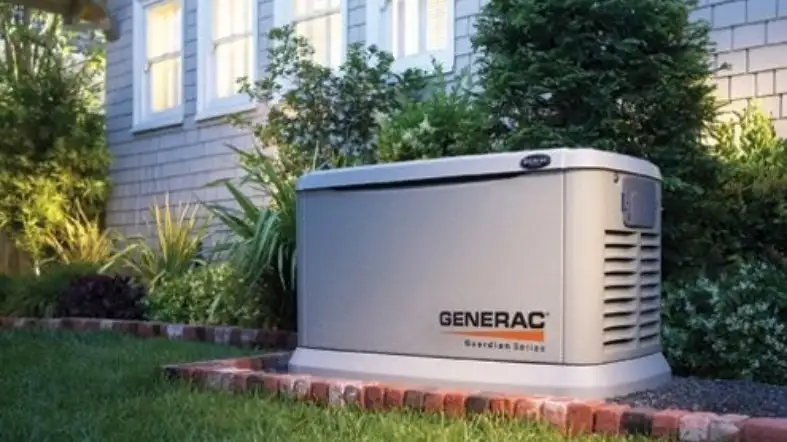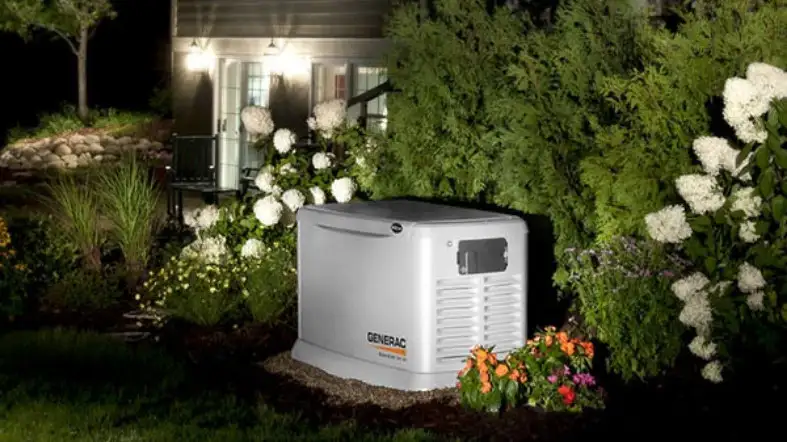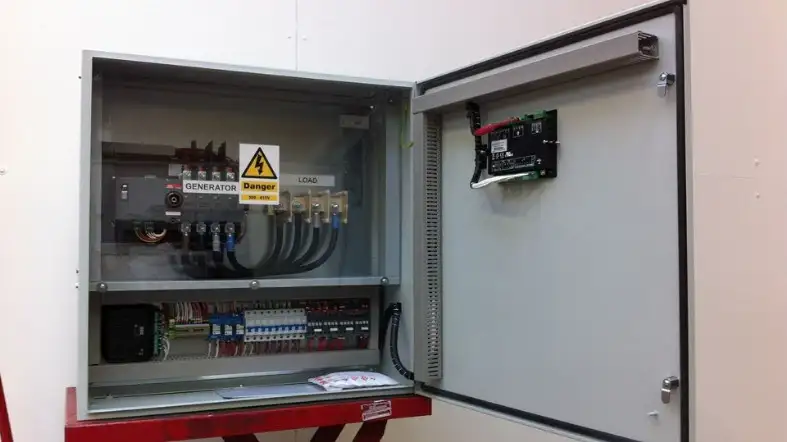Confused about selecting the right size for a standby generator? Don’t leave it to chance.
We break down the key considerations, ensuring your home stays powered during outages. Dive into our guide and light up your knowledge of standby generators.

Click Here To Check Recommended Generators
What Size Standby Generator Do I Need For My Entire House?
For an entire house, a home might require a 20,000 to 25,000-watt generator. The size of your standby generator should match the total wattage of all appliances you plan to run.
Standby generator chart for the entire house:
| Device | Running Watts | Starting Watts |
|---|---|---|
| Refrigerator | 600 | 2200 |
| Microwave | 1000 | 1000 |
| TV | 150 | 150 |
| Laptop | 50 | 50 |
| Fan | 75 | 150 |
| Air conditioner | 1500 | 4500 |
| Sump pump | 800 | 1200 |
| Electric heater | 1500 | 1500 |
How To Choose The Right Standby Generator Size?

Choosing the right size standby generator for your home is important for several reasons:
Power needs:
A standby generator is designed to provide backup power in case of a power outage.
If you choose a generator that is too small for your home’s power needs, it may not be able to power all of your essential appliances and systems, leaving you without the necessary power.
Cost:
A generator that is too large for your needs will cost more to purchase, install, and maintain.
It may also consume more fuel than necessary, which will increase operating costs.
Efficiency:
A generator that is the right size for your home will operate at its most efficient level, which means it will consume less fuel and have a longer lifespan than a generator that is oversized or undersized.
Safety:
A generator that is too small for your home’s power needs can overload and cause damage to the generator, as well as create a fire hazard.
An oversized generator can also create safety hazards, as it may emit more exhaust than necessary or cause a carbon monoxide buildup.
Convenience:
A generator that is the right size for your home will be easier to install and maintain, as well as provide you with the convenience of backup power without the added expense and hassle of an oversized generator.
Different Types of Standby Generators
There are many types of standby generators available in the market. Here are some of the most common types:

Home Generators
Home generators are designed for residential use. They are usually smaller and quieter than other types of generators.
They can be installed permanently or temporarily in your home. They can run on different types of fuel such as gasoline, propane, natural gas, or diesel.
They can provide power for your essential appliances and devices during a power outage.
Commercial Generators
Commercial generators are designed for business use. They are usually larger and louder than home generators.
They can be installed permanently or temporarily in your business location.
They can run on different types of fuel such as gasoline, propane, natural gas, diesel, or biogas.
They can provide power for your equipment and systems during a power outage.
Portable Generators
Portable generators are designed for mobility and flexibility. They are usually smaller and lighter than other types of generators.
They can be moved from one place to another easily. They can run on gasoline or diesel.
They can provide power for your devices and tools during a power outage, camping, or outdoor activities.
Inverter Generators
Inverter generators are designed for efficiency and quality. They are usually smaller and quieter than other types of generators.
They use a special technology that converts the power from AC to DC and then back to AC.
This makes the power more stable and clean, which is good for sensitive devices such as computers, phones, or TVs. They can run on gasoline or propane.
They can provide power for your devices and appliances during a power outage or outdoor activities.
Industrial Generators
Industrial generators are designed for heavy-duty use. They are usually larger and louder than other types of generators.
They can be installed permanently or temporarily on your industrial site. They can run on different types of fuel such as diesel, biogas, or biomass.
They can provide power for your machines and equipment during a power outage or emergency.
Factors Influencing Standby Generator Size Selection

Purpose of the Generator
The purpose of your generator plays a pivotal role in your selection.
It’s crucial to pinpoint if you need the generator for home use, for a commercial setting, for industrial tasks, or if it’s just a portable unit for sporadic needs.
Different applications demand generators with varying specifications and capabilities.
Type of Fuel Available
Fuel is the lifeline of your generator. It’s essential to identify the type of fuel that’s both accessible and affordable in your region.
Options typically include gasoline, propane, natural gas, diesel, biogas, and biomass. While gasoline might be common, propane could offer a cleaner burn.
Each fuel type brings its own pros and cons in aspects like storage, efficiency, and emissions.
Generator Placement and Storage
Consider where the generator will live. Placement is about more than just space. Generators need adequate ventilation to function efficiently.
They also need to be placed in secure locations that ensure they aren’t easily tampered with.
You should think about the aesthetic impact on your premises. Generators can be permanent fixtures in places like basements or garages.
Others can be moved around on trailers or truck beds for varied applications.
Noise Level Considerations
Generators can be loud. The noise level of your chosen generator can influence your relationship with neighbors and even local wildlife.
It’s worthwhile to examine the generator’s decibel rating.
A whisper registers around 30 dB, regular conversation is about 60 dB, while something as loud as a lawnmower can touch 90 dB.
Ensure your choice complies with any local noise restrictions.
Budget and Maintenance Costs
Your budget will inevitably steer your generator choice. Beyond the initial purchase, ponder over the ongoing maintenance costs.
Larger, feature-rich generators can be pricey. However, they might require more regular upkeep, translating to higher long-term costs.
Weather and Environmental Factors
Generators should withstand the elements. Whether you’re in a region with harsh winters or torrential rains, your generator should persevere.
Some models offer better resistance to environmental factors like rain, snow, and extreme temperatures.
Their build material and protective measures dictate their resilience.
Transfer Switches and Electrical Setup
Generators work in tandem with your existing electrical setup via transfer switches.
These switches toggle between the main power grid and your generator during outages. They come in two main types: manual and automatic.
While manual switches require human intervention, automatic ones offer seamless transitions.
Understand the intricacies of your home’s electrical configuration, including voltage and amperage, to ensure compatibility.
Local Regulations and Permit Requirements
Your local governance might have a say in your generator setup. Various regions have specific regulations governing generator use.
These can encompass noise levels, emissions, or even placement. Staying informed and compliant can save you from potential fines or disputes.
Manufacturer’s Recommendations and Warranties
Reputation matters. Dive into reviews and manufacturer’s guidelines. A robust warranty can save you from unexpected costs down the line.
Manufacturers with sterling customer service can make setup, maintenance, and troubleshooting a breeze.
Safety Features and Add-ons
Generators, while invaluable, come with their share of risks. Prioritize models with comprehensive safety features.
Features like circuit breakers protect you from electrical mishaps, while carbon monoxide detectors alert you to hazardous gas emissions.
Grounding rods, spark arrestors, and overheat protection mechanisms safeguard both the user and the unit.
FAQs About The Right Size Standby Generator For My Entire House
Can I just get a small portable generator for whole house backup?
No, a portable can only power a few appliances. A permanently installed whole house unit is needed for full coverage.
What fuel source is best for a whole house generator?
Natural gas or propane provides convenient, unlimited runtime. Diesel is efficient but requires fuel tank refilling.
What special setup is needed for a home standby generator?
It requires professional installation including a transfer switch to safely connect the generator to your home wiring.
How is standby generator power output rated?
In kilowatts (kW) which indicates continuous running capacity for home backup, unlike temporary surge wattage for portables.
How often should a home backup generator be tested?
Run the generator weekly under load for at least 30 minutes and routinely test the transfer switch function to ensure readiness.
Can I use the generator without a transfer switch in an emergency?
Never. Safely powering your whole house requires correct generator-home hookup via a transfer switch by an electrician.
The Bottom Lines
Finding the right size for a standby generator ensures your home stays powered. By understanding your unique power needs, you’ll make informed decisions.
Remember, the perfect generator size brings peace of mind during outages. Trust this guide, and you’ll never be left in the dark.
